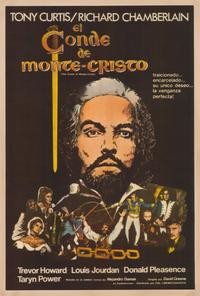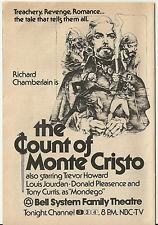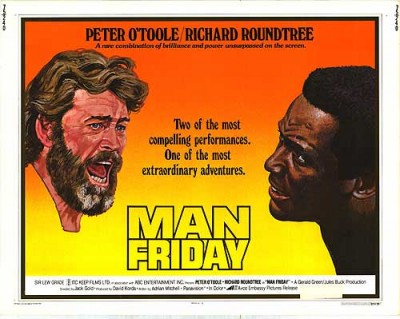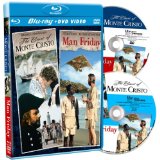| Reviews & Columns |
|
Reviews DVD TV on DVD Blu-ray 4K UHD International DVDs In Theaters Reviews by Studio Video Games Features Collector Series DVDs Easter Egg Database Interviews DVD Talk Radio Feature Articles Columns Anime Talk DVD Savant Horror DVDs The M.O.D. Squad Art House HD Talk Silent DVD
|
DVD Talk Forum |
|
|
| Resources |
|
DVD Price Search Customer Service #'s RCE Info Links |
|
Columns
|
|
|
Count of Monte-Cristo / Man Friday, The
The Count of Monte-Cristo premiered on U.S. television in January 1975 but was subsequently released theatrically in much of Europe that fall and into early 1976. Various cuts exist including, reportedly, a 119-minute British release, though the Blu-ray runs 103 minutes, the same length as its U.S. version, and there are abrupt fade-outs where television commercials are obviously slotted. However, the presentation is in widescreen.
Undoubtedly the project was spurred by the enormous success of another Alexandre Dumas adaptation, director Richard Lester's The Three Musketeers (1973) and The Four Musketeers (1974), which had featured Richard Chamberlain as Aramis. The Count of Monte-Cristo, as well as The Man in the Iron Mask (1977), another Dumas adaptation also starring Chamberlain, lack Lester's unique brand of satire but are extremely good on their own terms. I saw both during their network debuts but not at all since, yet they and especially Chamberlain's outstanding performances made an unforgettable impression.
The Count of Monte-Cristo boils Dumas's story down to its bare essentials, but is generally faithful and captures the spirit of the book extraordinarily well. Merchant sailor Edmond Dantès (Chamberlain) returns to Marseille to marry his sweetheart, Mercédès (Kate Nelligan, in her film debut). A rival for Mercédès's affections, Fernand Mondego (Tony Curtis), plots with seaman Danglars (Donald Pleasance), jealous of Dantès's promotion to acting captain after the death at sea of Bonapartist Leclère, and together they send an anonymous letter to Villefort (Louis Jourdan), the deputy crown prosecutor, accusing Edmond Dantès of being a traitor.
Detained on the eve of his wedding, Dantès is questioned by Villefort and there he freely admits to being asked by a dying Leclère to deliver a sealed letter to a presumed Bonapartist in Paris. As the man turns out to be the politically ambitious Villefort's own father (Anthony Dawson), to protect his own reputation Villefort has Dantès condemned to life in prison without trial at the Château d'If.
Six years pass and Dantès becomes a bearded wretch in rags. But then he meets a fellow prisoner, the saintly Abbé Faria (Trevor Howard), who for many years has been digging away at a tunnel to freedom that instead leads him to Dantès's cell. But the two lonely men become the dearest of friends. Together they continue digging while Faria passes on his vast wealth of knowledge and, near death, bequeaths a map to hidden treasure on the island of Monte Cristo. Dantès eventually escapes, finds the treasure, and plots to use his wealth to destroy the lives of Mondego, Danglars, and Villefort.
Chamberlain's TV role as Dr. Kildare (1961-66) made him a teen idol but he struggled a bit in the years to follow. The Count of Monte-Cristo anticipates Chamberlain's rise to "King of the Miniseries," with Shogun (1980) and The Thorn Birds (1983) being the two most famous examples, but few realize that between Dr. Kildare and his later miniseries he spent several years in England honing his craft in a desire to be taken seriously as an actor.
In The Count of Monte-Cristo Chamberlain convincingly ages from his mid-twenties to early fifties, expressing an exhaustingly vast but wholly believable range of emotions. His scenes with Trevor Howard are particularly memorable, moving, and even unique. Living in complete isolation for many years, when they first meet they are, in turn, shocked by the other's ragged and aged appearance, saddened by the realization that they themselves look equally horrific, but then are overcome with emotion in finding a fellow human companion. Howard by this time tended to walk through his movie roles, but here he's as good as Chamberlain. Perhaps the younger actor's sincerity and dedication inspired a higher caliber of performance.
Donald Pleasance, as Danglars, is hammy but well cast as the actor's indulgences are in keeping with the character, while Louis Jourdan makes for a particularly oily, devious villain. Tony Curtis, presumably cast because of his association with another ITC production, The Persuaders, is an odd choice to play Mondego, but the actor atypically withholds his usually flippancy, giving a restrained yet reasonably charismatic performance.
The picture was shot at Cinecittà Studios in Rome, and at picturesque locations such as Portovenere, also in Italy. French and Italians might find these locations completely unbelievable stand-ins for early 19th century France, but for other audiences they're at least quite attractive, even when the occasional TV antenna comes into view. (**** out of *****)
Man Friday has an interesting but one-note premise. It's an adaptation of leftist poet Adrian Mitchell's television script, a 1972 episode of Play for Today, in turn adapted from Daniel Defoe's Robinson Crusoe. The TV version starred Colin Blakely and Ram John Holder while the film stars Peter O'Toole and Richard Roundtree, and was filmed in Mexico.
The premise is a simple one, turning the familiar story on its head so that it's told not from Robinson Crusoe's perspective but rather from the native he names Friday. The result is a seriocomic, at times absurdist examination of British pomposity and western civilization generally.
Twelve years shipwrecked off the coast of Venezuela, the resourceful but lonely Robinson Crusoe (O'Toole) is shocked to discover there five black castaways, natives from a nearby island. Armed to the teeth Crusoe instantly shoots dead Friday's companions, who in a funeral ceremony for one drowned man had ritualistically cooked and began eating his remains so that the dead man's spirit can live on in them.
Friday, realizing he "must be a very cunning mosquito," surrenders himself to Crusoe, agreeing to learn English and, for the time being, accepting him as his master, in short allowing "him to think he was teaching me while at the same time I was teaching him." As Friday's English improves he struggles to understand Crusoe's strange concepts of religion (baptized by Crusoe he asks, "Must I be drowned in order to be saved?") and puritanical shame, personal possessions, national identity, competitive sports, capitalism, the division of workers and management, etc.
Much of the film is told by Friday in flashback, safely back home in his native village, regaling them with these bemusing, comical tales of his relationship with this strange man and his strange ways.
The film's message, that western world traditions and beliefs, and in particular British ones, seem awfully silly and pointless to an outsider unfamiliar with them, is perfectly clear from the start. While often quite clever and amusing, the film beats this same drum for the entire film, and one quickly loses interest, though Roundtree is pretty good and O'Toole is outstanding.
Man Friday is also dated, stating things that might have seemed fairly revelatory in 1972 but which now seem dated as well as obvious. While it skewers all aspects of British arrogance, Friday's carefree life back home is unbelievably idealized with probably zero anthropological authenticity. Carl Davis, a great composer for British television (The World at War, Hollywood), has always struggled writing contemporary film scores, and this one is pretty weak. The natives, for instance, sing songs that wouldn't be out of place in an Andrew Lloyd Webber musical extravaganza. (** 1/2)
Video & Audio
Back in the late 1990s I worked for Warner Bros. on the second floor of an off-site building whose first floor was occupied by a company making some of the earliest high-def video transfers. I'd occasionally stop by, curious to see a flyer they updated monthly listing the titles they had recently transferred, most of which at the time seemed to be Japan's NHK network. Both The Count of Monte-Cristo and Man Friday resemble these late-‘90s transfers. They're definitely high-def, but unimpressive by the much higher standards of a dozen years later. The film elements sourced on The Count of Monte-Cristo isn't the greatest, though neither transfer is particularly good. They seem to struggle particularly with nighttime scenes, though both primarily use sunny exteriors or brightly-lit interiors (in the case of Monte-Cristo) so the results are at least okay. The mono audio, English only with no subtitle options, is adequate, and the disc (which includes a DVD as well) is Region A encoded.
Extra Features
The only supplement is a modest still gallery for each film.
Parting Thoughts
Interesting productions with The Count of Monte-Cristo winning by a wide margin, this double-bill is Recommended, despite weaker than usual transfers.
Stuart Galbraith IV is a Kyoto-based film historian whose work includes film history books, DVD and Blu-ray audio commentaries and special features. Visit Stuart's Cine Blogarama here.
|
| Popular Reviews |
| Sponsored Links |
|
|
| Sponsored Links |
|
|
| Release List | Reviews | Shop | Newsletter | Forum | DVD Giveaways | Blu-Ray | Advertise |
|
Copyright 2024 DVDTalk.com All Rights Reserved. Legal Info, Privacy Policy, Terms of Use,
Manage Preferences,
Your Privacy Choices | |||||||


















